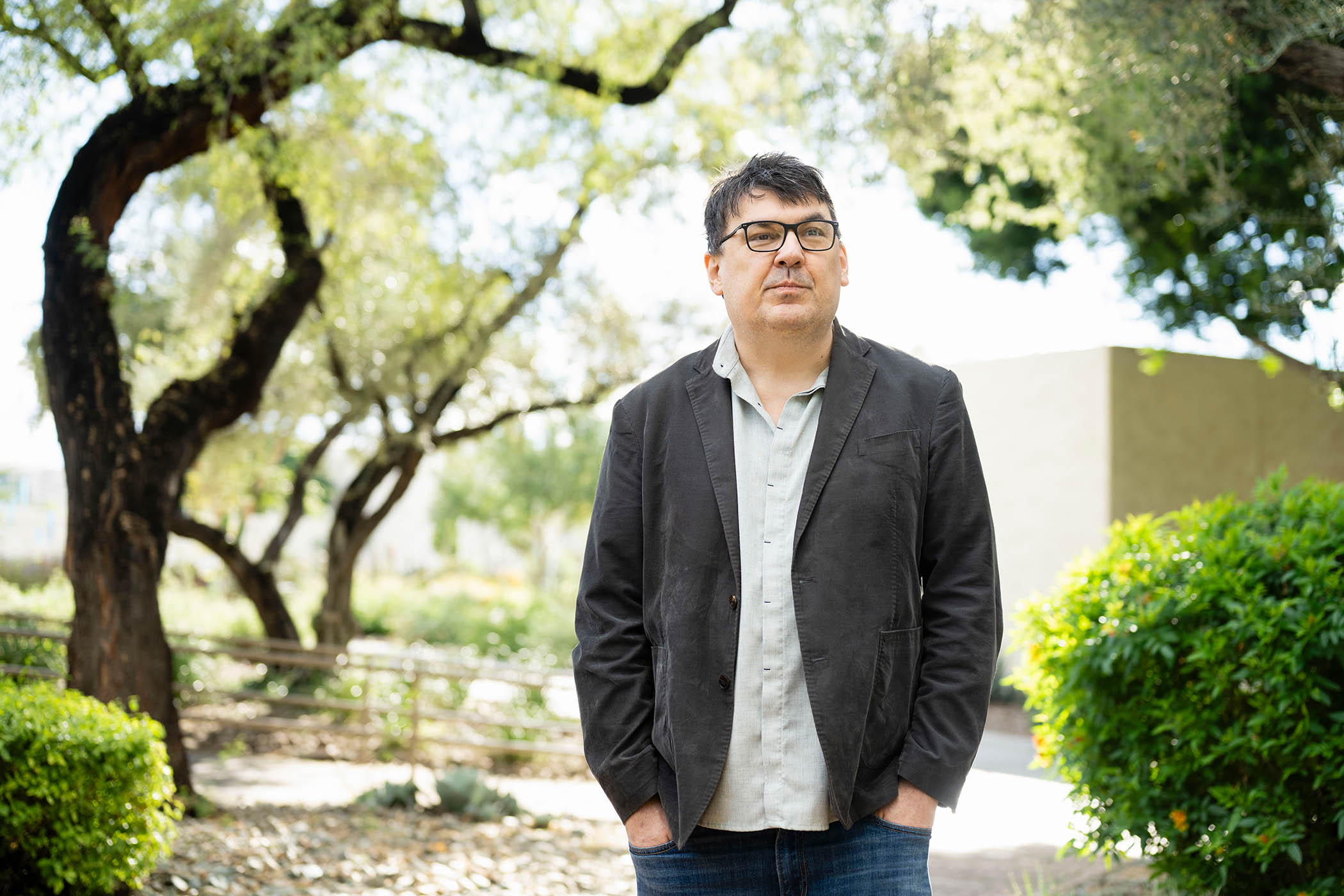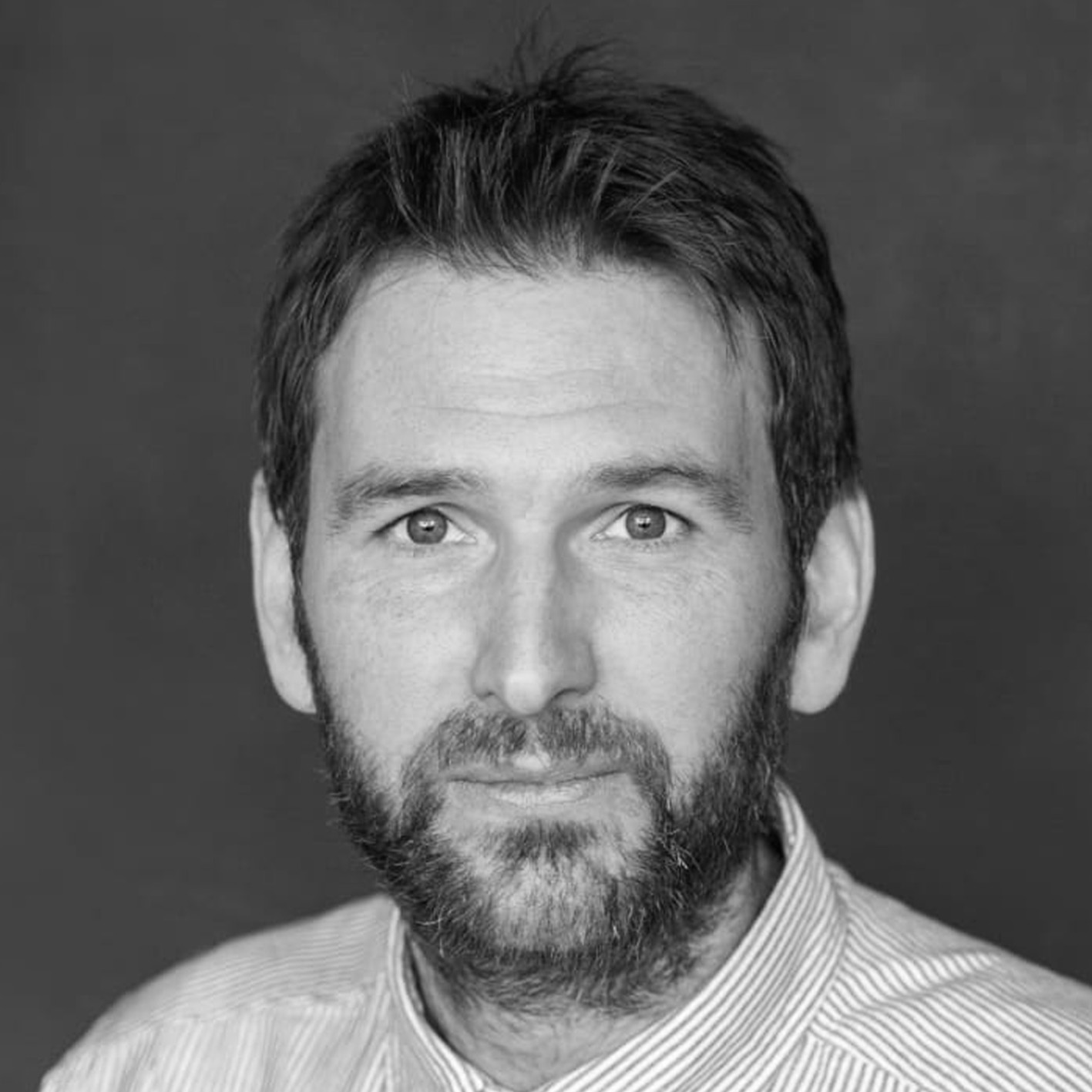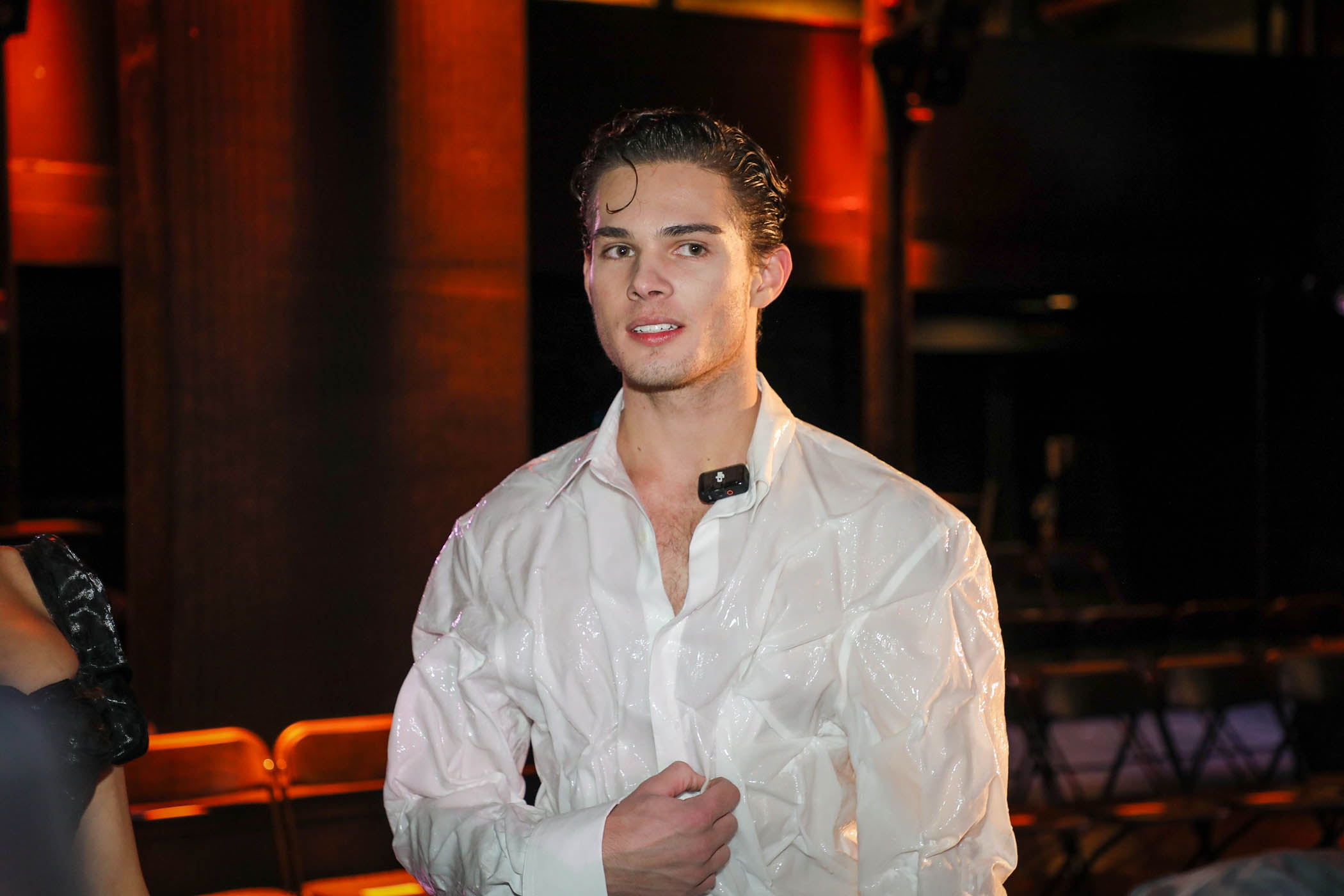Portrait by Mark Peterman
“Do you know what I think might have happened without the venlafaxine?” he asked, at one point. “I might have checked myself into a hospital, told everyone I’d gone mad and then come out saying: ‘I actually believe everything that’s written – I think trans women are women and blah, blah, blah, blah, blah.’ That’s the only thing that could have saved my life and career. But can you imagine me doing that?”
***
None of my first day with Graham Linehan went well. Afterwards, sat in a bar alone, I tried to understand why I couldn’t get through, why the piece I’d wanted to write for years would be a failure. “Can’t blame him for being suspicious of journalists,” my wife messaged. But there was something else. He turned up in a short-sleeved flowery shirt and immediately asked if it was OK for him to record the interview. I said yes, so he put his phone on the table next to mine and said it was for “self-defence” but also maybe for his next book. Then came the questions.
“Where do you stand on Sandie Peggie [the Fife nurse who objected to sharing a changing room with a transgender doctor]?” he said. “Where do you stand on the WPATH [World Professional Association for Transgender Health] files? The Cass review [of NHS gender identity services for children and young people]? Where do you stand on JK Rowling being cancelled? Where do you stand on all these issues?”
On the back foot, your mind does rapid calculations: is something going on here I haven’t understood? Am I going to end up in his book? My income depends on people who don’t know me very well giving me work; what if they don’t like what I think?
But I also believe journalists should be more transparent about their opinions, so I was transparent with him: “JK Rowling, I don’t think should be cancelled. I think women should have single-sex spaces. I don’t think trans women should compete in women’s sports.” It wasn’t enough.
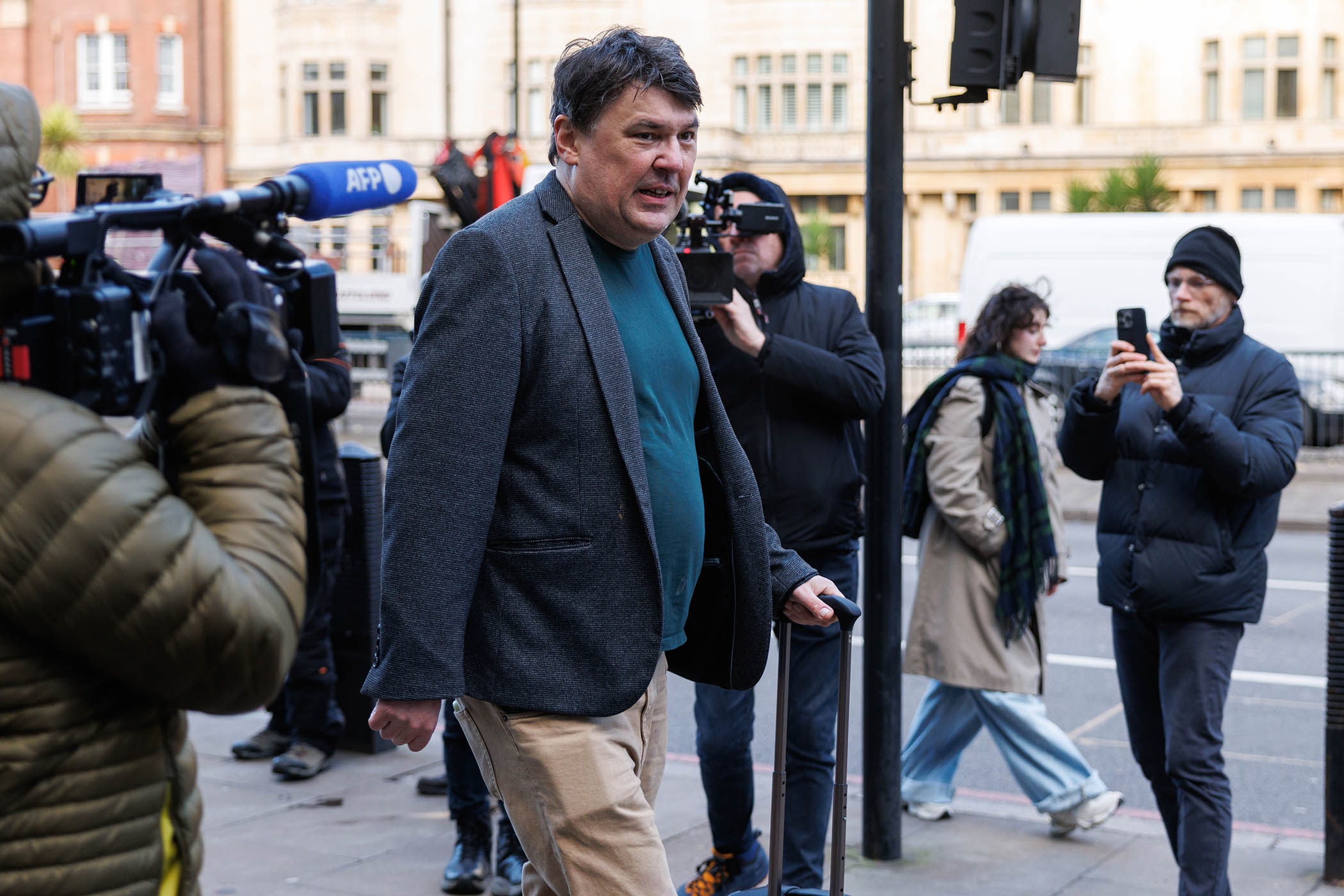
Graham Linehan outside Westminster Magistrates Court on 25 November
“What about various cases that are going on?” he said. “You see, I’m a little bit concerned, because I would have thought they would have sent someone who’d be totally across the issue and you seem like you’re not really aware of what’s happening.”
That annoyed me. I followed those cases and don’t turn up unprepared, but I didn’t want to get trapped, bogged down talking about the topics that dominate his social media posts because, as I’d said in messages, I wanted to write about him, his new life in Arizona, why he left the UK.
“That’s really nice,” he said. “I’m well up for it, but my problem is I’m a little bit tired of explaining a scandal over and over again, and having people more interested in me pointing than what I’m pointing at.”
Newsletters
Choose the newsletters you want to receive
View more
For information about how The Observer protects your data, read our Privacy Policy
I slumped against the restaurant’s wooden partition.
***
What do you want to know about Scottsdale? It’s in Arizona. It’s a city, but really a suburb of Phoenix. It’s in a valley surrounded by orange hills. There are golf courses, cacti, millionaires, shops selling dreamcatchers – and Linehan.
He asks me not to reveal precisely where he lives – “trans activists are very good at assembling addresses from a few key facts” – and would prefer I just said Arizona, but I remind him he talked on Joe Rogan’s podcast about scooting around Scottsdale. “They don’t know who I am, they don’t know about the issue,” he says of his new home. “It’s kind of heaven.”
He followed his friends Andrew Doyle and Martin Gourlay, formerly of GB News, over here. They were hired by US comic actor Rob Schneider’s production company and put in a word for Linehan. He moved in March and works for Schneider too. Having co-created Father Ted in the 1990s and created The IT Crowd in the 00s, Linehan is co-creating a sitcom called Tenure – “Our academics are like Father Ted academics: they’re very old and musty” – with Doyle, Gourlay and British comedian Jonathan Kogan. They’ve written eight episodes.
When ready, they’ll pitch it, but not in the UK. “I don’t want to work in England again.” Instead, they’ll try the US. “It’s sort of nerve-racking to have to knock on doors and go: ‘Hello, am I a human being yet?’ So I don’t like doing it. But, yeah, one of these days.” He looks visibly stressed talking about it.
I’m sorry if I’ve made him nervous, I tell him.
He says he’s always like this: “I’m much better because of the antidepressants. I would never be able to be like this under all the stress I’m under without the antidepressants.”
My aim was to break through the weird way none of this makes it into public discourse. I wanted to open people’s eyes
My aim was to break through the weird way none of this makes it into public discourse. I wanted to open people’s eyes
Later, over email, he asks if I could avoid being specific about the antidepressant in case “trans activists will use it against me”, but I remind him he talked about it in interviews before and tweeted the name of his medication and dosage last year. He started taking it when Donald Trump was first elected. “That sent me into a tailspin because I was still an NPC,” he says. When I ask him to clarify what he means by NPC – a non-player character – he says: “People who accept the consensus, whatever the consensus happens to be.” Now the medication helps him cope with “the job”. Being on trial. Being sued. Being alienated.
“I look at it like the way first world war soldiers used to take speed. It’s a necessary drug for the circumstances, right? When your name is being destroyed, when every friend turns their back on you, when even the BBC won’t tell the truth about you, it can get to you.” He says it’s “the drug for the job, but I’d like to stop the job. And I’d like to come off the drug.” Therapists have got in touch and tried to help him, including one who told him they recognised signs of post-traumatic stress disorder. “Every time I do it, I love them, they’re so sweet, and I really thank them for it, but therapy just doesn’t work for me.”
On my way to Arizona, British Airways’s in-flight entertainment included Father Ted, The IT Crowd and Motherland (for which he’s credited as a writer on the first series and a co-creator). All three won multiple Baftas. He was part of television’s in-crowd, friends with British comedy’s most fashionable stars – and then Twitter happened.
“While all this comedy was going on,” he wrote in his memoir, Tough Crowd, “and I was building a life, the internet arrived. That life split into two, as it probably did for you, dear reader. Two personalities, one swimming through ‘meatspace’ and the other through the internet’s wires and dots and numbers.”
***
In 2018, while recovering in hospital after having a cancerous testicle removed, he tweeted his opinions on “gender ideology” for the first time. People attacked him. He kept tweeting. “I’d started taking these,” he says of the medication. “They fucking chilled me out immediately, and so when things started going south, I was skating over those moments heedlessly.” The police knocked on his door. He kept tweeting. His work vanished. He kept tweeting. His marriage broke down. Friends distanced themselves. He’s been sued, arrested and on 25 November, a week after I visited him in Arizona, he was in a London court after being accused of harassing a trans activist on social media (he was found not guilty) and damaging their phone (he was found guilty but told me he’s appealing). As I’ve watched it all happen, I’ve been staggered he’s not changed course, despite what he’s lost, but also surprised he’s survived.
“If I didn’t have the antidepressants,” he says. “I wouldn’t be able to deal with any of it.”
***
Who’s the most famous person who’s been in touch with him? I ask.
“I think I could say now,” he replies. “Jimmy Carr.”
In 2019, Linehan was still living in Norwich when Carr got in touch to offer his support. They arranged to meet for lunch at a local place called the Ivy. When Carr arrived, Linehan wasn’t there. “I got a call saying: ‘Did you not want to meet, after all?’”
Linehan didn’t tell anyone about the lunch for years. “It was a real gesture of kindness,” he says. “He trusted me and I kept it a secret.” Last month, on stage in Minnesota, Carr was asked if he had any jokes that would get him arrested at Heathrow. An audience member then mentioned Linehan and Carr said: “I fucking love Graham, because whether you agree with Graham or JK Rowling or not, you have to admit the thing that’s in short supply in our society is bravery and he’s a fucking brave guy.
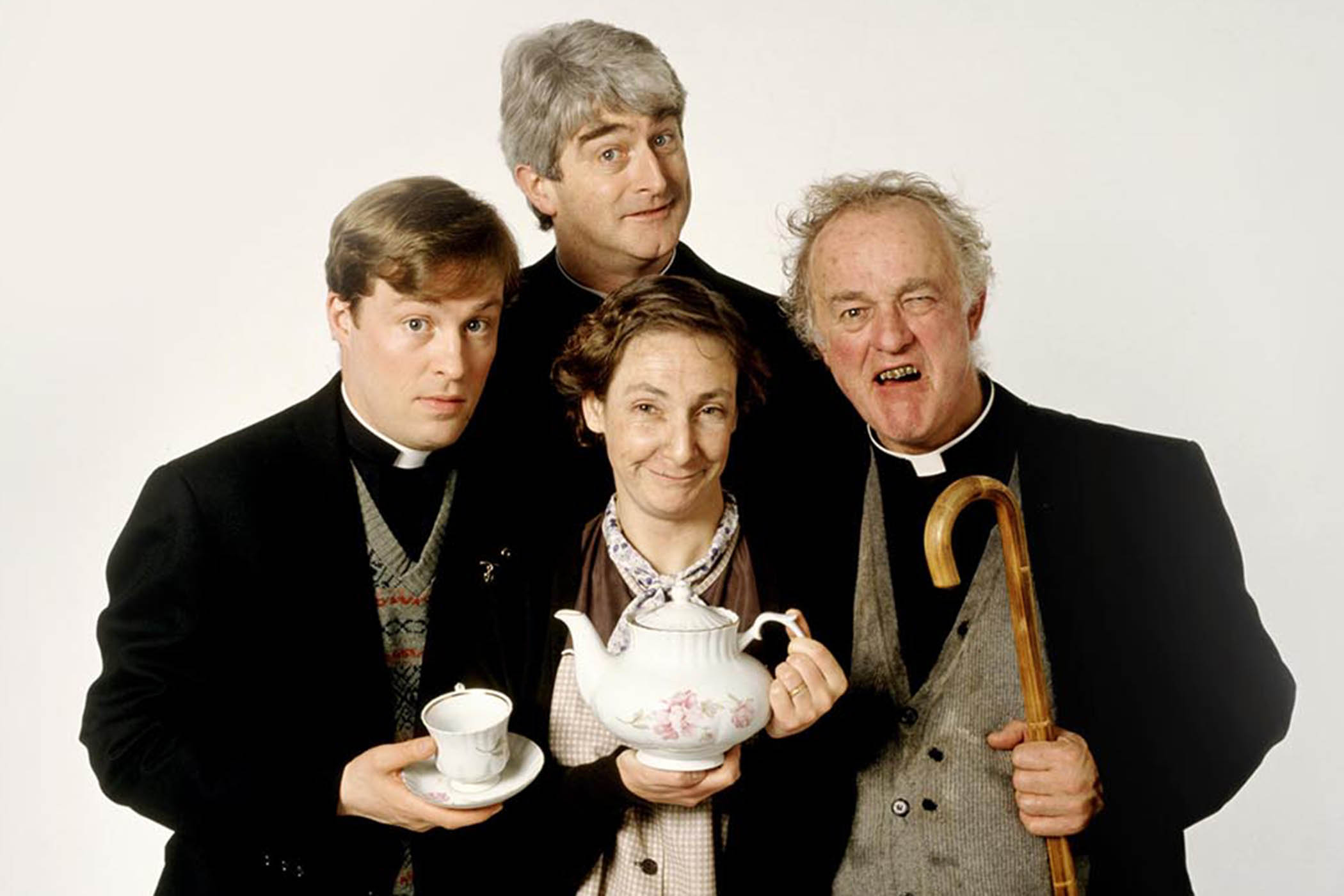
Ardal O’Hanlon, Dermot Morgan, Pauline McLynn and Frank Kelly in Father Ted
“It’s easy now to say men are men, women are women,” Carr went on, “and then there’s a very tiny percentage of people that want to live different lives, let them do their own thing, but at the time, when he started saying it, it was fucking incredible that he was saying it. And he gave up everything. He lost his family, he lost his career, he lost everything, and now he’s getting fucking arrested at the airport. Fucking madness.” Carr posted the clip on his X account with a caption: “You’ve got The First Amendment … Cherish it.”
I ask Linehan if he felt emotional when he saw the video. “No, you don’t feel emotional on venlafaxine,” he says. “In fact, whenever I come off it, the first thing that tells me I’ve come off it too fast is I cry at anything, like a film, even a scene that’s not meant to be sad.”
I ask why he tries to come off it. “For the reasons I’ve just described. [When you’re on it] your feelings are very level,” he says.
It’s because he wants to feel differently, I ask?
“Yeah. You lose touch with your normal range of human emotions, you know?”
***
But can’t you just be nicer, Graham?
Some don’t like what he’s fighting for; others don’t like how he fights. I remember not liking his tweets about New Zealander Laurel Hubbard, who competed in women’s weightlifting at the Olympics in 2021. I thought Hubbard was wrong to enter the competition, but all the pile-on felt far too much for an individual to bear.
“They’re a public figure during the Olympics,” says Linehan now.
Yeah, I mutter.
“That’s weak,” he replies. “This is a man who stole medals from Indigenous women from New Zealand. The current [Masters] world record is held by him, not by a fucking Indigenous woman. They trained their whole lives to do that stuff and he …”
Later in our conversation, Linehan defends his misgendering: “In the early days, I wouldn’t misgender people because I was part of that taboo. I thought: ‘There must be a good reason for that,’ until I realised it’s bollocks.” When I ask about him being cruel to someone on X, he says: “If someone comes after me, I always [go]after them twice as hard.” But he also goes at people hard who haven’t come at him at all, including using insults such as “troon” (a portmanteau of “trans” and “goon”) or “groomer”.
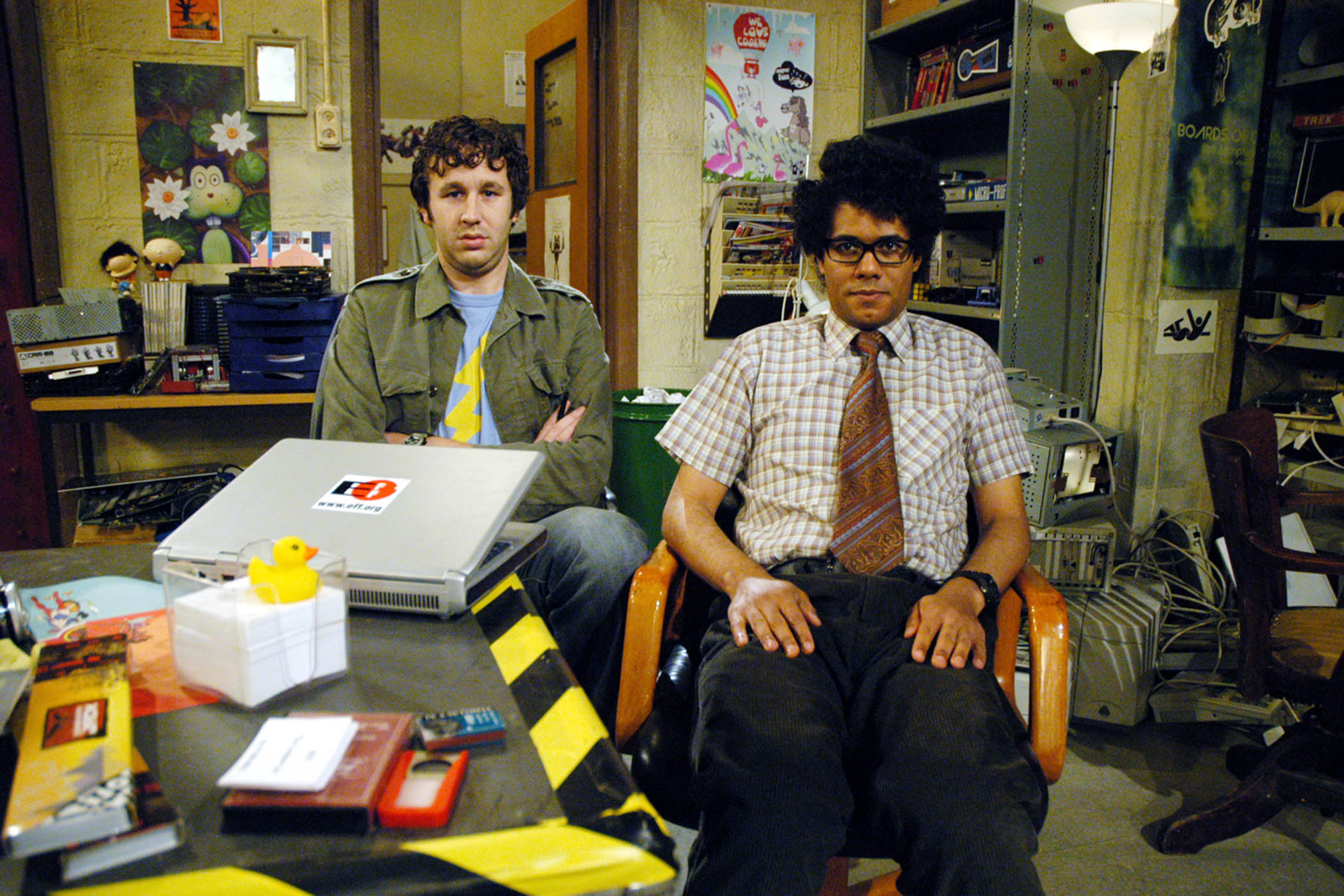
Chris O' Dowd and Richard Ayoade in Linehan’s The IT Crowd
In 2020, a group of women who were trying to achieve some of the same goals as Linehan by less aggressive means got in touch with him for what one of them, journalist Sarah Ditum, later described to me as an “intervention”. They were concerned about his posts and thought he should take a break, and having been cancelled themselves for holding similar opinions, they knew how it felt to be close to the brink, but by supporting each other, they had pulled back from the brink. “You have to want to be pulled back, though,” she said.
Linehan rejected that intervention. “I was trying to keep my marriage together and I was trying … I was being called a bigot by everyone and berated and all sorts of other things. And sure, at that time then, maybe my absolute despair at what I was going through caused me to lash out at people, or be angrier than I should have been, or whatever. But the point was, [those women] had zero empathy for it. They had no empathy for what I was going through. It was all tone policing and finger-wagging.
“I didn’t just dismiss them out of hand. I dismissed them because everyone was telling me to shut up, and they were just doing it in a different way, you know, and I was sick of people telling me to shut up.”
***
I tell him I saw him tweeting about Jon Ronson last night. Arizona is seven hours behind the UK, so while lying awake at 3am local time, I looked at my phone and saw Linehan tweet about Ronson. He does that fairly regularly, having fallen out with the journalist years ago. “Yeah,” says Linehan. “There’s certain people, like Jon Ronson was a friend of 25 years, and for him to pretend he doesn’t know the problem with a man on a woman’s basketball team or a man in an Australian football team in Australia …”
They fell out over Linehan’s social media posts, with a photo of a trans athlete seemingly the breaking point. Ronson thought it was incendiary and unpleasant. Ever since, Linehan has been frustrated that Ronson won’t say how he feels about various trans issues. Ronson keeps his views private.
At the point when he’s made it clear he wants to disengage, I ask Linehan if he does not feel bad for him? Like tweeting about him at night? Because that can happen anytime, I say – it’s not like going into the office and having a quarrel there, where it’s confined within certain hours.
“I presume he’s got me muted or blocked,” says Linehan. “He certainly won’t defend his ideas in a debate, for instance.” It’s clear from his posts on X that a large part of Linehan’s frustration is his former friends not publicly saying where they stand.
***
In 2019, the BBC ran a story about a rugby player who transitioned from a man to a trans woman in their 30s. I couldn’t understand how someone who had lived as an adult man – who knew how it feels to be bigger and stronger than almost all the women around you – could suddenly decide it was OK to play rugby against women.
A lot of us were still trying to work out where we stood back then, how to cause the least anguish to the fewest people. I remember discussing that story with a close friend, who said they didn’t see a problem with it, but I knew this person well, and I didn’t believe they believed what they were saying. I remember it made me feel completely alone. I ask Linehan if that’s what he’s experienced, but multiplied. “Oh, my God,” he says. “Absolutely.”
Victoria Coren Mitchell is another former friend he criticised on X this month after a trans person was on her TV show. She replied on X: “In my experience, Graham, *nothing* will suffice to stop you pestering me. You seem to really want a rise out of me, and I’m not someone who’s comfortable with anger. Only Connect is just a harmless quiz show. I try to ignore your relentless messages like I would with any other troll. But on this occasion, out of respect for the friendly relationship we used to have and the brilliant writer you used to be, I will ask you one more time to please, please, please leave us alone. If you are still in there somewhere: stop it. You MUST be better than this.”
Linehan says he isn’t trolling. “The only people I ever get into back and forth with are people who are rude or people who do that really gaslighting thing of pretending to believe something but not saying why or how they believe it, you know?”
***
I reviewed a book recently and the author mentioned philosopher Mary Midgley’s comments on obsession. Midgley wrote in her book Wickedness that letting an obsession take you over is consenting to some degree “to one’s own death”.
I ask Linehan about suicide. “I don’t want to talk about that,” he says, “because every time I do, it’s been manipulated and used against me, not by journalists, but by the other side. But, you know, all I can say is I’m feeling fucking rosy at the moment.”
But, really, that Midgley quote made me think about those who loved Linehan before he tweeted from hospital in 2018, who I guess must feel like Coren Mitchell – unsure if the man they knew is still even in there. I ask about his ex-wife, the writer Helen Serafinowicz, but he doesn’t want to talk about her (they had two children, who will visit Linehan at new year), and he rejects my suggestion that the breakdown of his marriage was because he was obsessed. “I wasn’t obsessed,” he says. “I was trying to stop people lying about me. And every fucking time I tried to do that, someone else would lie about me.”
When I ask about people calling him monomaniacal, he responds by telling me about people crowdfunding on GoFundMe “to cut their breasts off”. His point being: why wouldn’t I be monomaniacal? When I later look on GoFundMe, I see profiles of people who are raising money for what they call “top surgery”. Some mention NHS waiting lists being too long. I can’t get an accurate number, as GoFundMe doesn’t respond to my emails, but many are in the UK. Many are in their late teens and 20s.
I ask Linehan what people like me look like to him, when we’re not writing or talking about this subject – the issue – all the time? Do we seem heartless?
“No, not at all. In fact, I mean, I’ve been trying to understand it for, like, 10 years. I can’t quite get it, but I think that one aspect that has been incredibly successful for the trans movement is simply their ability to stay undercover and to keep their various agenda kind of quiet. What’s a good example? You know, the fact that self-ID was introduced in Ireland without there ever being a debate about it – how did that happen? Well, it happened because the media refuses to talk about it in any kind of substantive way.”
The first thing this planeload of Arizonians see is me, a comedy writer, being pulled off a plane for tweeting
The first thing this planeload of Arizonians see is me, a comedy writer, being pulled off a plane for tweeting
I ask if it’s frustrating that people focus on his tone or his behaviour instead of his argument.
He makes the point about the finger again. “It’s me pointing at things and people looking at my finger,” he says. “I guess my finger must be unbelievably fascinating. All I’m trying to do is break through.”
The problem is people are wary of the finger that’s doing the pointing; the way it does seem to obsess, the way it can be cruel. On a podcast last month called 1984 Today!, Linehan said he’d get off a plane if the pilot was a trans woman. “Really?” said the host, surprised. “Yes I would,” said Linehan. “Because they’ve argued this themselves, that there’s a high suicide tendency among trans-identified people.”
I asked via email if he really felt that way. “Of course,” he wrote. “No one who thinks they’re a different sex should be flying a passenger plane.” Over WhatsApp, he told me the risk had been pointed out to him by a passenger plane pilot.
On my second day in Scottsdale, we meet for coffee. Trying to shift the conversation, I ask him to describe a writing method he uses, which he learned from Dan Harmon, creator of Community and co-creator of Rick and Morty. “It’s a distilled version of the hero’s journey,” says Linehan, “which was a big cliche in Hollywood film-making for a long time, but he took it and he made it very simple so that you could do it in half an hour. And it’s always the same eight points, I think it is.”
He borrows my notepad to map it out. “The character wants something, enters a new world to get it, has adventures, discovers things about himself in the new world. Then, at the bottom of the circle, he’s done being pushed around by events. He starts to fight back, and then he comes back to the real world, right, having defeated whatever thing there is to be defeated, and the last point is having changed somehow – something in this character has changed.”
***
Heathrow was a tipping point. On 1 September this year, Linehan flew back from Arizona to the UK to appear in court over the harassment and criminal damage charges, but when the plane landed, a message over the speaker asked him to step forward. He got his bag, stepped off the aircraft and was arrested. “The UK’s reputation for free speech is in the toilet at the moment over here,” he says, when I ask him about it. “And the first thing this planeload of Arizonians see is me, a comedy writer, being pulled off a plane for tweeting, you know. It was just hilarious.”
Five armed police officers took him to the airport’s police station. He was fingerprinted, had a mugshot taken and was put in a cell with a toilet, a thin rubber mat and a pillow. He went to sleep for about seven hours. “I had a fucking brilliant sleep,” he says. He was interviewed about three of his tweets. One described an image of protesters as “a photo you can smell”. One called the protesters “misogynists and homophobes”. One said: “If a trans-identified male is in a female-only space, he is committing a violent, abusive act. Make a scene, call the cops and if all else fails, punch him in the balls.”
After the interview, he was taken to hospital because his blood pressure was high. The police released him but said he couldn’t go on X, so he posted about it on Substack and went to sleep in his hotel. “When I woke up it was all over the internet,” he says. Toby Young’s Free Speech Union (FSU) took up his case and tweeted about it. Rowling tweeted about it: “What the fuck has the UK become? This is totalitarianism. Utterly deplorable.” Elon Musk tweeted about it: “Police state.”
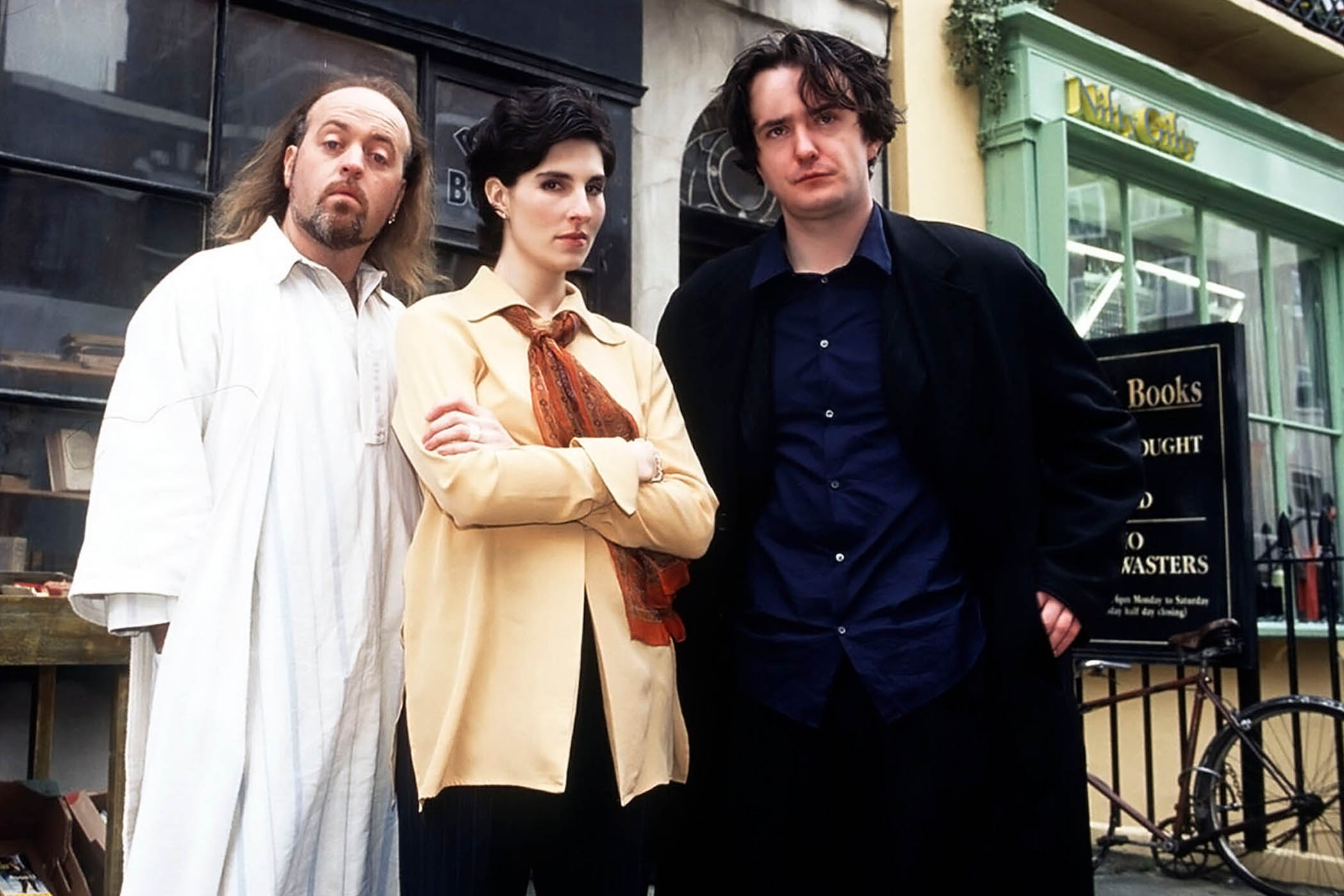
Black Books, another Linehan creation, starred Bill Bailey, Tamsin Greig and Dylan Moran
Linehan was invited on the BBC. His story was covered by the New York Times (“How the arrest of a comedian could reshape Britain’s free speech laws”) and Fox News. He’s been told Trump mentioned him. “The man who first plummeted me into a depression is now one of my few defenders.” Keir Starmer’s spokesman released a statement clarifying the prime minister’s policing priorities, which did not include Linehan’s arrest. The Metropolitan police announced they would no longer investigate “non-crime hate incidents” – though they still record them. (A review into the national policing of non-crime hate incidents was already under way and continues.). With help from the FSU, Linehan is suing the Met: “I have a feeling they’ll just settle,” he says. “Because they don’t want to go into court on this – it’s so hilarious.”
Linehan had the upper hand. “They threw me into the briar patch. You know that phrase? It’s what I wanted them to do. Brer Rabbit loves the briar patch. They threw me into the briar patch and now I’ve been on Megyn Kelly [The Megyn Kelly Show, a podcast by the former Fox News host], I’ve been on Joe Rogan [The Joe Rogan Experience podcast]. My only aim was to try and break through the sort of weird way none of this discourse makes it into public discourse. I really just wanted to open people’s eyes.”
***
On my second night in Arizona, I saw him tweeting in the early hours again. “Well, last night it was because I played poker late,” he says. “I just love poker and I love poker players. As I’ve often said: ‘You never hear poker players saying to each other: ‘Did you hear Ed got misgendered?’”
I’d imagined him lying in bed miserably scrolling on his phone like me, but he was at a casino. His posts give the illusion that his life is just trans stuff, but it’s not.
“My Arizona life is very dull, to warn you,” he’d told me before I flew over. He does his scriptwriting. He writes his Substack (“My living,” he says). He does interviews (he was late for coffee as he was on TalkTV). He’s selling merch. As well as playing poker, he’s taken up golf. “I’ve got a good swing, I think, for someone who’s never played.” He goes to the gym. He plays video games: ARC Raiders and Battlefield. “Reading by the pool and writing. Reading by the pool. Writing. Playing computer games and going to dinner. That’s about it.”
Once a week, he gets together with his co-writers to catch up and play board games. He just went to a Halloween party hosted by the daughter of Jordan Peterson, who also lives here. (Linehan wore a prison outfit.) He was planning to spend Thanksgiving with writer Derrick Jensen, an environmentalist who has been ostracised for his views on trans issues, but had to cancel due to the trial. “He’s had his publishing career destroyed,” says Linehan. “He was in academic publishing and now he’s just this lovely old guy who lives in the woods, you know? That makes him sound really bad but, yeah, these are my new friends.”
“I’m very happy to be here,” he adds. “It’s so calming. It’s so quiet. There’s no drama of any sort.” After finishing his coffee, he wanders off into the sunshine. A lot of people might assess that life and think: “I’ll stop now.” But he won’t.
A few hours later, he sends me an example of how he’s been using AI. It’s a “hidden role deduction” game he’s working on. At the top is the prompt he put into ChatGPT: “You are five blind lesbian adventurers out for a good night out. Slaying dragons and whatnot. But one of your number is a hulking great troll pretending to be a woman. Find the troll lesbian and then devise an amusing punishment without giving him an erection.”
